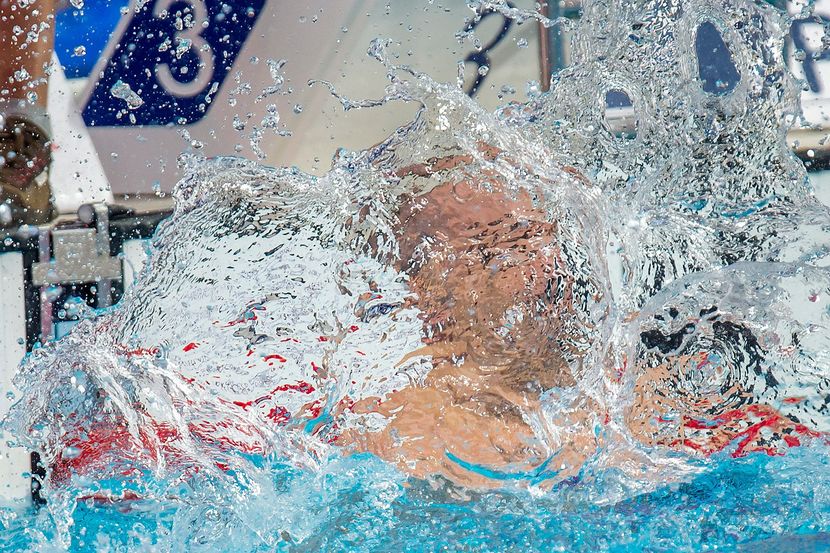
Four-time World and Olympic champion Qin Kai (CHN) started his fight for the gold from the third round: the Chinese great totalled 94.50 for the execution of a Reverse 3 1/2 Somersault, Tuck (3.5 DD), placing second with 262.20 points. Kuznetsov was still leading (269.05) while Kvasha stood in third place with 251.00.
The ranking was the same after the fourth round, with the Russian diver loosing some advantage over Qin Kai, from 6.85 to 5.85, while Kvasha kept his third spot.
In the fifth round, Kai performed a Forward 4 1/2 Somersault, Tuck (3.8 DD) but not perfectly. He still got quite high marks from the judges and managed to keep his second place, though the entry into the water was not clean and followed with a big splash.
The last round, as it often happens, changed the situation greatly: Kuznetsov slightly missed the entry after performing a Forward 2 1/2 Somersault 2 Twists, Pike, while Kai's last dive was perfectly executed (Reverse 2 1/2 Somersault 1 1/2 Twists, Pike). The Chinese scored 506.20 and that was just 0.85 points ahead of the Russian diver. The battle for the bronze finished also dramatically: He Chong got 486.00 and that was 0.15 better than Kvasha.
China's duo He Zi and Wu Minxia were strong favourites in the event. The Russian team - two-time European champion (and daughter of legendary diver Irina Kalinina) Nadezda Bazhina and Svetlana Philippova seemed to be the most evident rivals for the Chinese. The Moscow meet is the first test for the Russian partners as they have never competed together before.
After two optional rounds (i.e. no degree of difficulty imposed), the leading position was captured by He Zi/Wu Minxia (108.00), followed by Russia (104.40) and Canada's Jennifer Abel/Emilie Heymans (103.80).
The most complicated programme for the last three rounds was performed by American divers Kassidy Cook/Cassidy Krug with a total degree of difficulty of 9.1, while China, Canada and Italy (represented by Francesca Dallape/Tania Cagnotto) totalled a 9.0 DD and Russia 8.9.
After the third round, China led with 186.30, followed by Canada (177.60) and Russia (171.90). The advantage of the Canadian team did not last long, though: Jennifer Abel and Emilie Heymans missed their fourth dive, Reverse 2 1/2 Somersault, Pike. The Russians performed the same dive and finished with 247.50, while Canada scored 231.60. The fourth round - just one step to go to the finish line - confirmed China's dominance in the event, with the duo totalling 265.50.
As Chinese divers were absent from the event, the fight for the podium took place between Mexico, Great Britain, Germany, Cuba and Russia. Great Britain unexpectedly withdrew from the event (Waterfield felt ill) so it happened to be the shortest event of the day with just four countries competing.
The team of Cuba was the first to impose its lead, with Jose Guerra and Jenkler Aguirre scoring 196.44. Victor Minibaev and Ilia Zakharov (RUS) took the second position but not for a long time: the divers made a serious mistake in the following dive and finished in the last place.
In the fifth round, Cuba had a great lead over Germans Sasha Klein and Patrick Hausding (375.62 to 347.31). The reason for such great difference was that none of the teams (except Cuba) managed to avoid mistakes. The gold of Guerra/Aguirre was therefore well deserved.
Reigning World champion Paola Espinosa (MEX) and Olympic champion Chen Ruolin (CHN) set high standards from the very beginning. The fight between the two great divers started from the very first dive: it was Chen Ruolin who took the lead (81.00) with a well-performed Forward 3 1/2 Somersault, Pike. Espinosa followed with 73.50 points, after executing the same dive.
The Mexican made a big mistake while performing her second dive, Back 3 1/2 Somersault, Tuck. For the last couple of years, Espinosa has been surprising the world with the difficulty of her dives but it is not easy to add difficulty and still uphold quality. As a result, Espinosa placed fifth before the third round.
The opposite example was Malaysia's ever-impressive talent, Pandelela Rinong. The degree of difficulty of her programme was not so high compared to the other finallists, but the quality of her dives was quite remarkable. The diver won her semi-final in the morning and took third after two rounds in the final - just 0.15 behind Alexandra Croak (AUS). She moved to second place after her third dive (220.65) and that was 23.55 less that Chen Ruolin scored, but 10.50 better than Croak’s score.
These three divers came to the final round in the same order with big margins between one another: Chen Ruolin had 328.35, Rinong 297.45 and Croak 286.95. Such point gap made it clear that the position of the divers on the podium would be the same if no terrible mistake happened.